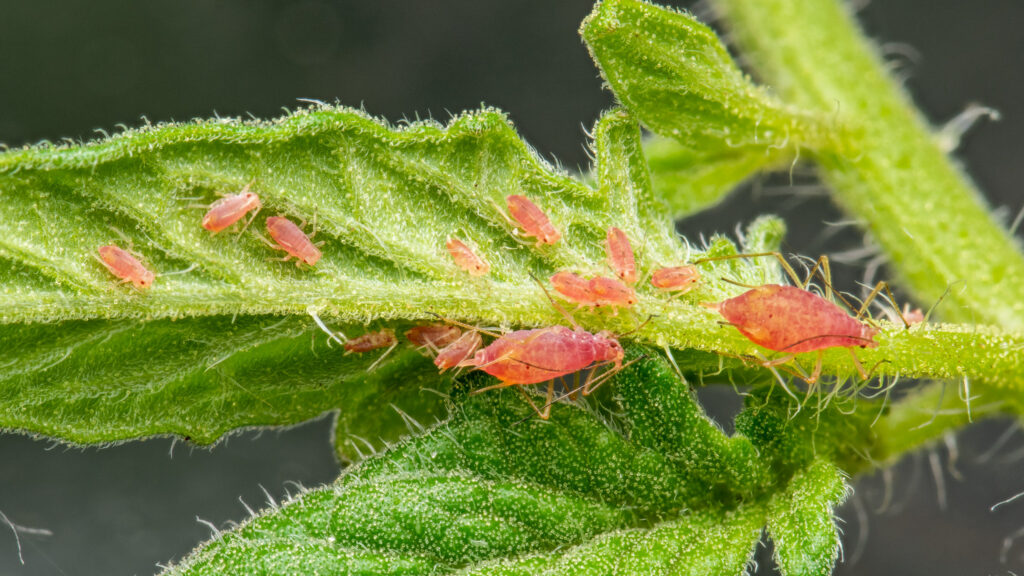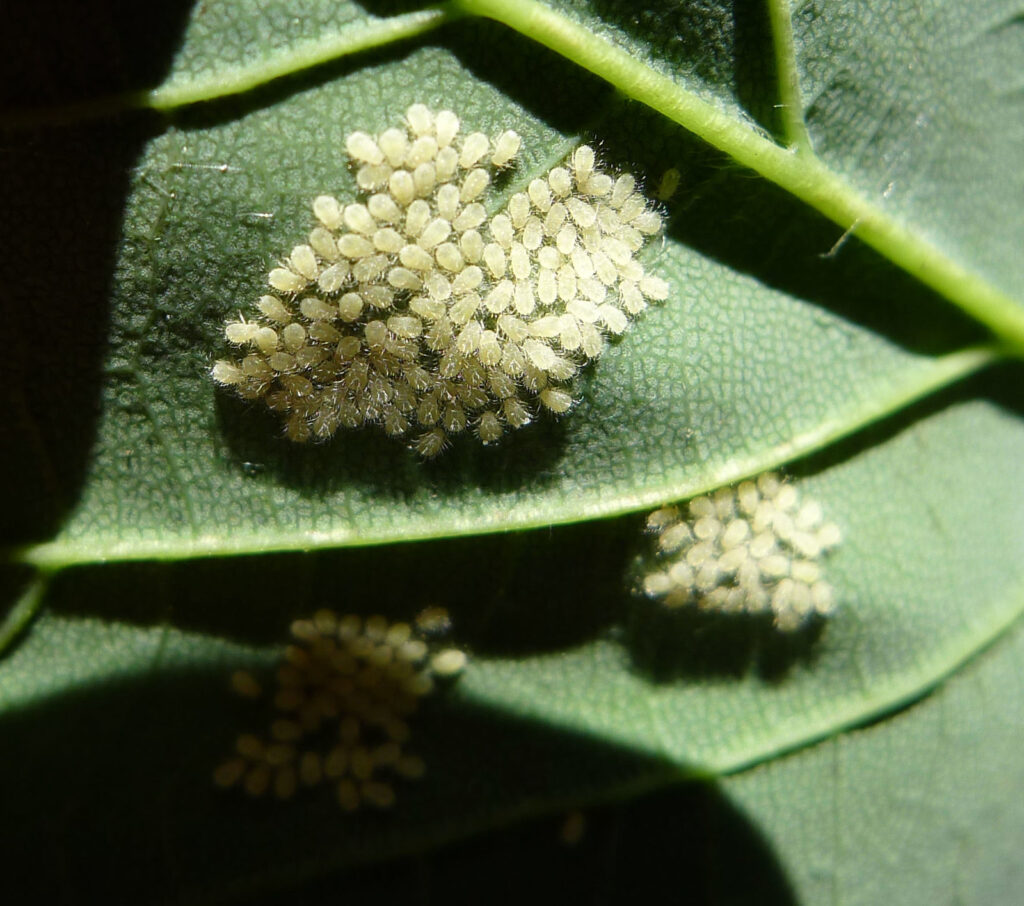
Aphid management made straightforward
Aphids are miniature sap-sucking insects that, if left unattended, can cause significant damage to your garden. These notorious garden pests multiply rapidly and can wreak havoc on your plants by feeding on their sap, causing leaves to curl, turn yellow, and even fall prematurely. However, with the right strategies and knowledge, aphid management can become a manageable task.
In this comprehensive guide, we’ll discuss straightforward and effective ways to protect your garden from aphid infestations.
Identification of aphids
To effectively combat aphids, their precise identification is necessary. Aphids come in an extraordinary range of colors, including rich green, pale yellow, deep black and even cushiony pink. Their distinctive pear-shaped bodies are often misinterpreted as miniature tear-shaped insects.
What sets aphids apart is their tendency to cluster mainly on the undersides of leaves and along plant stems. These pests have the amazing ability to reproduce both sexually and asexually, which means their population can skyrocket in a matter of weeks.
Natural predators
Using the power of natural predators is one of the most environmentally cordial and effective ways to combat aphids in the garden. Masters of aphid control include ladybugs, lacewings, parasitic wasps, and even some species of birds.
These beneficial insects have a voracious appetite for aphids, making them invaluable allies in the fight against pests. To attract these beneficial insects to your garden, consider planting nectar-rich flowers such as marigolds, dill and fennel. These flowers not only provide food, but also habitat for these aphid-eating warriors, ensuring they stay and protect your garden.
Here are some natural predators of aphids:
- Ladybugs (Ladybug Beetles): Ladybugs are probably the most well-known predators of aphids. Both larvae and adult ladybugs feed on aphids. A single adult ladybug can eat dozens of aphids a day, making them valuable allies in the fight against aphids.
- Laces: Lacewings, especially lacewings, are voracious predators of aphids. Their larvae, often called “aphids” because of their voracious appetite, feed on a variety of garden pests, including aphids.
- Parasitic wasps: Some parasitic wasps lay their eggs inside aphids. When the wasp larvae hatch, they eat the aphids from the inside, eventually killing them. This natural parasitism can assist control aphid populations.
- Hoverflies (syrphid flies): Hoverflies resemble bees, but are harmless and feed on nectar. However, their larvae are excellent predators of aphids. Hoverfly larvae actively hunt and eat aphids, making them valuable in biological pest control.
- Predatory beetles: Several species of beetles, such as the aphid and the armyworm, feed on aphids. They can be effective in reducing aphid numbers if they are present in your garden.
- Birds: Some bird species, including sparrows, wrens and finches, include aphids in their diet. Attracting birds to your garden by providing birdhouses, feeders and birdbaths can assist to naturally control aphid populations.
- Praying mantises: Although mantises are more generalist predators, they readily eat aphids whenever they get the opportunity. They can serve as beneficial insects in your garden’s ecosystem.
- Spiders: Some species of spiders, such as crab spiders and orb weaver spiders, trap aphids in their webs and operate them as a food source. These spiders can assist control aphids in your garden.
- Ground beetles: Ground beetles are nocturnal predators that feed on a variety of garden pests, including aphids. Providing suitable habitats for ground beetles, such as mulch or ground cover, can encourage their presence.
- Predatory bugs: Insects such as the big-eyed beetle and the damselfly are natural predators of aphids. They pierce aphids with their piercing mouthparts and feed on their body fluids.
Companion planting
Companion planting, an age-old gardening technique, can be a strategic ally in your aphid control arsenal. Some plants emit a mighty odor that aphids find offensive. By replanting these aromatic herbs and vegetables with susceptible plants, you create an olfactory barrier that discourages aphids from taking up residence.
For example, the potent aroma of garlic, chives and basil acts as a natural repellent. On the other hand, nasturtiums act as sacrificial plants, attracting aphids. They distract these pests from valuable crops, effectively protecting the main plantings.

Mechanical control
For smaller aphid infestations, the operate of mechanical control methods can be both practical and effective. A mighty stream of water from a hose can drive aphids from plants and destroy their colonies.
Pay special attention to the underside of leaves, where aphids often hide. Repeat this process regularly as needed to control the aphid population. Alternatively, you can operate a cushiony brush to gently scrub the aphids from the plant surface. Be careful and gentle when using this method to avoid damaging the plants.
Organic sprays
In cases where the aphid population becomes overwhelming, organic insecticidal soaps or neem oil sprays may be an effective solution. These organic garden pest control products are less harmful to beneficial insects compared to chemical alternatives and can effectively control aphids.
To ensure success, follow product label instructions and apply treatment during cooler times of the day to minimize the risk of damage to plants. Always perform a patch test on a compact area first to ensure the plants tolerate the treatment without side effects.
Here are some organic sprays to assist control aphids:
- Neem Oil: Neem oil is obtained from the neem tree and is an effective organic pesticide. It interferes with the feeding and reproduction of aphids and acts as a deterrent. Neem oil can also repel other garden pests and is sheltered for beneficial insects when used as directed.
- Insecticidal soap: Insecticidal soaps are made from potassium salts of fatty acids. They work by destroying the protective outer covering of aphids and other soft-bodied insects, causing them to dehydrate and die. Insecticidal soap is considered sheltered for humans, pets and beneficial insects when used correctly.
- Horticultural oil: Horticultural oils, such as dormant oil or summer oil, suppress aphids and their eggs by covering them with a gaunt layer of oil. These oils are typically applied when plants are dormant or during the growing season and can be an effective method of controlling aphids.
- Pyrethrin-based sprays: Pyrethrin is a natural insecticide obtained from chrysanthemum flowers. Upon contact, it quickly kills aphids and other pests. Pyrethrin-based sprays have low toxicity to humans and pets and are biodegradable.
- Garlic-pepper spray: Homemade garlic and pepper sprays can effectively repel aphids. These sprays are made by mixing garlic cloves, balmy peppers and water. The potent smell and zingy nature of the spray can keep aphids from settling on your plants.
- Necessary oils spray: Some indispensable oils, such as peppermint, rosemary, and thyme, have insect repellent properties. You can create a homemade indispensable oil spray by diluting the oils in water and applying them to your plants. Be sure to follow the appropriate dilution ratios to avoid damaging the plants.
- Diatomaceous Earth: Diatomaceous earth is not a spray, but is a fine, powdery substance obtained from the fossilized remains of diatoms. Sprinkled on plants or around garden beds, it can provide an effective physical barrier against aphids and other crawling insects. Diatomaceous earth works by damaging the waxy coating on the insect’s exoskeleton, causing dehydration.
- Homemade spray soap: You can make your own organic spray soap by mixing a few drops of gentle liquid soap (such as castile soap) with water. This creates a solution that can be sprayed on aphids to break down their cell membranes and control their numbers.

Application
Aphid management, although complex at first, can be done precisely and carefully. Accurately identifying these garden pests, attracting their natural predators through strategic planting, practicing companion planting, using mechanical methods to control smaller infestations, and using organic sprays when necessary will assist protect your garden from aphid infestations.
By following these comprehensive steps, you will not only keep your garden pest-free, but you will also ensure the health and viability of your plants throughout the growing season. Apply these straightforward yet effective strategies and you’ll be well on your way to a garden that thrives in peace and abundance.
Cover image source: Stephan Gonzalez
